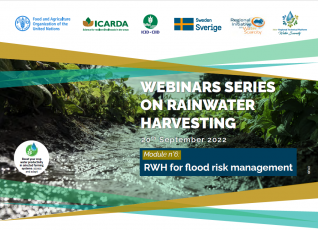The Green Roads for Water concept was presented in the webinar series on Rain Water Harvesting – Module 6 “Practices and Effectiveness of RWH Systems in Flood Prevention and Mitigation,” on the 20th of September, 2022, from 13:00 to 14:30 CET.
Please access the webinar presentation here.

For more information o the webinar background, outcomes, and schedule, check the flyer here.
More info on the session can be found below.
Background
Water scarcity is a critical challenge in countries and regions with arid and semi-arid conditions and fast-growing water demands. This is mostly the case in all of the countries across the NENA Region, where food demand and food insecurity continue to grow, widening the water supply-demand gap in most countries. Furthermore, the anticipated impact of climate change in the NENA region is indicative towards an increased intensity of rainstorms and flash floods, while the total amount of annual precipitation rates shows declining trends. During the last 20 years, interest has been renewed in rainwater harvesting (RWH) as one of the most effective climate adaptation strategies to cope with water scarcity, thus reducing the pressure on the limited freshwater resources and increasing rainfed crop productivity.
This webinar series on Rainwater Harvesting aims to provide an overview of RWH applications and illustrates, with country examples, the diversity of approaches. It will try to unlock the potential of rainwater harvesting applications in the NENA region by highlighting the role of rainwater management in overcoming the current challenges in achieving water security. It will also shed the light on the need for innovations in economics, social consensus and supportive laws and regulations to ensure a widespread uptake of RWH technologies in the NENA region.
About the Module 6
This module explores the role of RWH in controlling flood risks and using floods productively in rural areas. Several approaches are presented (e.g. road water harvesting, flood spreading) and their effectiveness to control floods is further discussed. Case study elements in the MENA region are included in the presentations.
Organization
Main Conveners:FAO/WEPS-NENA project & Water Scarcity Initiative (WSI) with: ICARDA, ICID and FAOinter-Regional Technical Platform on Water Scarcity (iRTP-WS)Contributing Partners:MetaMeta (Netherlands) and the University of Natural Resources and Life Sciences, Vienna (Austria)Contact Persons:Domitille Vallée Domitille.Vallee@fao.orgFahide Si Tahar Fahide.SiTahar@fao.orgHeba Al Hariry Heba.alhariry@fao.orgSimon Tanios Tanios.Simon@fao.orgLanguages:English and French with live translation
